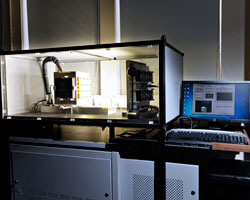Loughborough launches the ‘world’s most advanced’ PV Remote Lab for distance learners

Loughborough University is set to launch the world’s most advanced Photovoltaic (PV) Remote Laboratory for distance learning students.
The ground-breaking new laboratory has taken almost four years to build and students from around the world who enrol on the distance learning version of the Masters course in Renewable Energy Systems Technology in October will be the first to use it.
Students on the Masters course need to understand how different types of solar panels perform. However, characterising solar panels is a complex activity with up to four variables influencing performance at any one time.
The new laboratory enables students to remotely control and investigate all these variables and, as a result, analyse and understand different PV device performance.
The laboratory takes advantage of recent developments in LED technology and, with a power density of up to 1000 W/m2, students can harness the power of the sun on their desktops.
Students are able to conduct experiments from their computer, and by manoeuvring and changing the PV panel, temperature and irradiance intensity, they can see the effects for themselves, in real time, via the laboratory webcam.
The scientific data produced can then be downloaded for their report.
The PV remote laboratory has been a labour of love for the two people who came up with the idea and drove the project – academics Dr Richard Blanchard and Dr Sheryl Williams, from the School of Electronic, Electrical and Systems Engineering.
Dr Williams said: “This innovative technology is the latest addition to our continually evolving distance learning student experience and we believe it’s the first time a lab of this nature has been built in terms of its complexity and the number of controllable variables.
“October’s intake on the Distance Learning version of the Masters course in Renewable Energy will be the first to take advantage of it. However, early feedback from existing students who have tested the facility has been extremely positive.”
The project was part funded by the University’s Distance Learning Development Fund and Midlands Energy Graduate School (MEGS), and was built by an enthusiastic and dedicated team of academics, technicians and students. In addition, there was help and support from National Instruments and SCITEK Consultants Ltd.
Dr Blanchard said: “We see this as a fantastic addition to the MSc. It enables our students to achieve the same learning outcomes as their counterparts on campus but with the flexibility of doing this at a time and place to suit them.
“In addition, the use of remote labs can support research and enterprise activities by enabling the sharing of experimental equipment and facilitate off-site training.”
For full information about the design and development of the lab see: http://www.lboro.ac.uk/departments/eese/research/research-centres/crest/rpl/
To see a short YouTube video of the Lab from the student’s experience please go to: http://youtu.be/eiRz9RyeoFk.